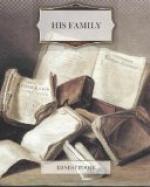“In their lives, too, we shall be there—the dim strong figures of the past.”
From his desk he gathered a few belongings. Then he looked into John’s small room, with the big gold motto over the desk: “This is no place for your troubles or mine.” On the desk lay that small album, John’s parting gift to Deborah’s boy. Roger picked it up and walked out of the office. He had never liked good-byes.
In the elevator he noticed that his shoes needed shining, and when he reached the street below he stopped at the stand on the corner. The stocky Greek with bushy black hair, who had run the stand for many years, gave him a cheery greeting; for Roger had stopped there frequently—not that he cared about his shoes, but he had always liked to watch the crowds of people passing.
“No hurry, boss?”
“None,” said Roger.
“Then I give a fine shine! Polish, too?”
“Yes, polish, too.” And Roger settled back to watch.
“And put in new shoe strings,” he added, with a whimsical smile.
Men and women, girls and boys by thousands passed him, pushing, hurrying, shuffling by. Girls tittering and nudging and darting quick side glances. Bobbing heads and figures, vigorous steps and dancing eyes. Life bubbling over everywhere, in laughter, in sharp angry tones, in glad expectant chatter. Deborah’s big family. Across the street was a movie between two lurid posters, and there was a dance hall overhead. The windows were all open, and faintly above the roar of the street he could hear the piano, drum, fiddle and horn. The thoroughfare each moment grew more tumultuous to his ears, with trolley cars and taxis, motor busses, trucks and drays. A small red motor dashed uptown with piles of evening papers; a great black motor hearse rushed by. In a taxi which had stopped in a jam, a man was kissing a girl in his arms, and both of them were laughing. The smart little toque of blue satin she wore was crushed to one side. How red were her lips as she threw back her head....
“Silk or cotton, boss? Which you like?” Roger glanced at the shoe strings and pondered.




